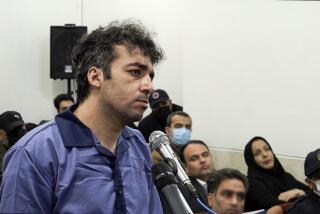‘Chemical Ali’ hanged by Iraq government
- Share via
Reporting from Baghdad and New York — The Iraqi government on Monday hanged Ali Hassan Majid, one of the most notorious figures of Saddam Hussein’s regime, who had earned the nickname “Chemical Ali” for his gassing of Kurds in the late 1980s.
Majid was executed after being sentenced to death in four cases brought before an Iraqi criminal court for the killing of Kurds and Shiites during the rule of Hussein, his first cousin.
The hanging was announced by government spokesman Ali Dabbagh on Iraqi television. Prime Minister Nouri Maliki said in a statement, “By executing Ali Majid, another black page in the book of repression, genocide and crimes against humanity has been closed.”
Monday’s execution was carried out after a final guilty verdict was rendered against Majid last week for the 1988 gassing of Kurds in the northern town of Halabja, an attack that killed as many as 5,000 people and came to symbolize Hussein’s brutal methods.
Later, state television broadcast two pictures of Majid, according to Agence France-Presse. One showed him in an orange-red jumpsuit with his face uncovered. In the second photo, Majid wore a black hood and was flanked by two masked men.
U.S. forces captured Majid in August 2003 and he was first sentenced to death in June 2007 for his role in the broad military campaign against the Kurds that was called Anfal, Arabic for the “spoils of war.” The offensive lasted from 1987 to 1988 and saw up to 182,000 people killed, villages razed and families herded into internment camps.
Majid received another death sentence for his involvement in the suppression of an uprising among Iraq’s Shiite majority after the 1991 Persian Gulf War. The revolt ended with thousands killed and many buried in mass graves.
The Iraqi judiciary also sentenced him to death for his role in quelling a Shiite revolt after Grand Ayatollah Mohammed Sadeq Sadr was killed in 1999 and his supporters rioted.
In court, Majid had presented an image in stark contrast to his reputation as Hussein’s bloodthirsty crony: a thin figure with gray hair who propped himself up with a cane.
The fates of two of Majid’s codefendants in the Anfal case remain undecided. Iraqi President Jalal Talabani, a Kurd, and senior Sunni politicians oppose the death sentence handed to Sultan Hashim Ahmad Jabburi Tai, a former defense minister and commander in the north during the Anfal campaign.
Hashim surrendered to American forces in 2003 and may have collaborated in some form with the U.S. military and Iraqi opposition before the U.S.-led invasion in 2003. His supporters argue that he was following orders during the Anfal campaign, while many of the country’s Shiite elite believe he should be executed.
Hussein Rashid Mohammed, the former deputy head of army operations, has also been sentenced to death.
Kurdish politicians applauded the death sentence against Majid.
“I hope everyone who is a criminal and commits these big crimes will be punished,” said parliament member Mahmoud Othman, a Kurd.
But Othman lamented one sore point that hung over the Anfal and Halabja trials: Saddam Hussein, hanged in December 2006, was never brought to court for his actions against the Kurds.
“I think the wrong thing in all this process was that Saddam Hussein was quickly executed,” Othman said. “Everything was ordered by him. He should have been left alive to see the trials and to talk about the secrets and who helped him from outside.”
Salman is a Times staff writer.
More to Read
Sign up for Essential California
The most important California stories and recommendations in your inbox every morning.
You may occasionally receive promotional content from the Los Angeles Times.













